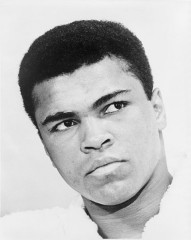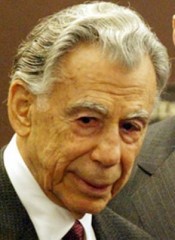Hello, Science fiction and Canadian television fans!
On Sunday October 7, 2012 we will be honored to interview a much loved and respected actor, Aleks Paunovic who has been very busy lately, appearing in a wide variety of films and television productions!
This includes Aleks Paunovic wonderful new short film “The Hostage” which you can view here (featured above) or you can view the film with on You Tube!
We will learn about Aleks’ past projects such as MGM Studios Stargate franchise, Battlestar Galactica, Smallville, Sanctuary and the hit Canadian show, Arctic Air as well as some very interesting information about an unusual background.
Aleks Paunovic, joins WormholeRiders You Decide in an exclusive interview this Sunday at 8 PM Eastern and 5PM Pacific.
Boxing – I’d be the first person to tell you that I really do not get it. Why people want to beat each other up for fun makes no sense to me. So, it is time to do some research to try to figure out this pugilistic ritual that so intrigues and entertains. I am told that boxing is now one of the most popular fitness regimes available today. If it is a lean, toned, strong body you are after then this could be the sport for you. Think Hilary Swank. Think Mark Wahlberg from The Fighter. Boxing is on the rise in popularity both on the big screen and off.
From a psychological point of view, boxing is an interesting and unusual sport. Unlike most sports out there; the objective is to defeat your opponent by injuring him or her. This is in stark contrast to other sports where whenever anyone is injured, play is stopped and the person is tended to. In boxing, say naysayers, the reason for getting into the ring is to make sure your opponent is defeated and cannot continue.
Further criticism states that the sport has a huge psychological effect on the athletes and a lot of them start to have serious mental issues. Numerous suicides have been noted in the sport and a lot of boxers are arrogant, exaggerated versions of normal people. With the intense  media coverage and the stress and pressure of the sport it is no wonder a lot of boxers are going off the deep end, according to some.
media coverage and the stress and pressure of the sport it is no wonder a lot of boxers are going off the deep end, according to some.
As well, the physical side of boxing has been highlighted by the media. Long term damage caused by concussions to boxing legends such as Muhammad Ali and others, have drawn attention to the risk of this sport. But there is also an up-side.
Boxing, if done for fitness, can be positive. When boxing is used strictly to tone up and get your heart pumping, the focus becomes getting into shape, not causing physical damage to your opponent. So, if you think that it might be fun to pummel your opponent to get into shape, think again. Being a pugnacious pugilist is just not on.
Also, scrap any ideas you have about beating a punching bag by yourself, boxing is very much a social sport. There are classes available in most communities if this is something you are interested in. Classes are usually made up of around 15 to 20 people and concentrate on pad work and sparring. This means you face opposite someone and throw combination punches at them which they block with their padded gloves. Then you swap and block theirs. A typical class will start with a 10-minute warm-up, followed by about half an hour of boxing and finishing with a 10-minute warm-down.
Classes will teach you how to punch properly — it’s about technique not strength. Do not think that boxing is an easy ride, though: it is seriously hard work. Boxing is a high intensity, full body workout that will keep you moving the whole time. When you are not throwing a punch, you are ducking and weaving — or doing squats and abdominal work.
Weight loss, increased agility and coordination, muscle tone and greater fitness all result from boxing. Many people think that boxing is all about the arms but it is actually a cardio work-out for the whole body. It is especially good for toning your bottom and quadricep muscles, which  is perfect for women who want to lose weight around their bottom and thighs as part of an overall reduction program.
is perfect for women who want to lose weight around their bottom and thighs as part of an overall reduction program.
Boxing has been a popular competition at every Summer Olympic Games since its introduction to the program at the 1904 Summer Olympics, except for the 1912 Summer Olympics in Stockholm, because Swedish law banned the sport at the time. The 2008 Summer Olympics were the final games with boxing as a male only event. Beginning with the 2012 Summer Olympics, women’s boxing is included in the program.
For a sport with such a rich history, it is not without controversy. Obviously, the whole long term, multiple concussion issue that leads to dementia, a permanent condition, is problematic. Should a sport that has the potential to cause such harm to participants be permitted to continue?
Dr. Charles Bernick, the chief investigator for a study, funded mostly by Las Vegas hotel magnate Kirk Kerkorian and conducted at the Cleveland Clinic’s new Lou Ruvo Center for Brain Health in downtown Las Vegas, is attempting to determine the connection of concussions to Parkinson’s Disease.
Muhammad Ali suffers from Parkinson’s disease, a degenerative brain condition that some doctors say can be brought on by punches to the head. Ali’s own  neurologist told The Associated Press last month, however, that he did not believe the former heavyweight greats condition was caused by head blows.
neurologist told The Associated Press last month, however, that he did not believe the former heavyweight greats condition was caused by head blows.
“Our study is not to prove that getting hit in the head will lead to brain damage. We know that already in some sense,” he said. “We know being exposed to repetitive blows to the head is a risk factor to developing these conditions, but you can’t prove it in any one person unless you have an autopsy.”
The list of boxers who suffered from brain damage is a long one, and goes back a long way. Louis had dementia symptoms late in life, while Sugar Ray Robinson – who sometimes boxed every other week and fought an astonishing 1,403 rounds in his career – developed Alzheimer’s disease in his later years. Jerry Quarry, a heavyweight contender who fought Ali twice, died at the age of 53 from dementia pugilistica, while his brother, Mike, a light heavyweight, died from the same thing at age of 55.
As far back as 1928, doctors were studying the causes of brain damage in boxing. That year, Dr. Harrison S. Martland told the New York Pathological Society about his observations of fighters, “Fighters in whom the early symptoms are well recognized are said by the fans to be `cuckoo,’ `goofy,’ `cutting paper dolls,’ or `slug nutty,'” Martland said. “Punch drunk most often affects fighters of the slugging type, who are usually poor boxers and who take considerable head punishment, seeking only to land a knockout blow. It is also common in second rate fighters used for training purposes, who may be knocked down several times a day.”
 Still, there are large numbers of fighters who have never suffered any noticeable brain damage, and doctors have yet to pinpoint why these athletes do not seem to be affected by repeated blows to the head.
Still, there are large numbers of fighters who have never suffered any noticeable brain damage, and doctors have yet to pinpoint why these athletes do not seem to be affected by repeated blows to the head.
Much still is not known about why some fighters develop Alzheimer’s or dementia pugilistica – also known as punch drunk syndrome – while others seem to suffer little from repeated hits to the head. The study, he said, could lead to better ways to predict which fighters are more at risk for brain damage later in their lives.
That the study – the first big project for the new center – is based in Las Vegas is fitting because the city is recognized as the boxing capital of the world and is also the headquarters of the Ultimate Fighting Championship.
Confidence can be defined as security. There is a level of comfort and security in knowing that you have the ability to take care of yourself. While most people consider boxers to be brute brawlers, there is actually a sense in which those who are trained in combat sports feel less inclined toward conflict because they feel less of a need to prove themselves.
De-stressing is a common benefit of all exercise in general. The circuit training element of boxing allows for optimal oxygen-saturated blood flow. More oxygen to the head equates to an increase in the detoxing metabolic activity in the brain. But the aspects of circuit training that are beneficial for the brain are amplified in boxing where both the chemical and conscious aspects of de-stressing (learning self-defense skills) meet.
This one almost goes without saying. Who does not want to just punch a wall sometimes? The boxing fitness workout is centered on explosive bursts such as punching a bag or your partner’s mitts that translate to much more productive anger release than punching a wall (which can break and make you even madder).
More oxygen to the brain allows not only the brain’s metabolic processes to function more efficiently, but it allows the brain to perform its primary functions more efficiently as well. People actually pay a lot of money to have this done artificially in oxygen bars. Increased oxygen to the brain boosts alertness, concentration, and energy levels. The way that boxing maximizes this effect is that, instead of just performing exercises, it incorporates hand-eye coordination drills to boost one’s ability to think and perform at the same time.
Daniel Goleman, in his book Emotional Intelligence, determines that what typically makes someone successful in life is not their IQ, but their EQ or Emotional Intelligence. This has much more to do with the level of mental clarity, toughness, motivation and self-control an individual has than their brain smarts. Boxing is an ideal discipline for honing these attributes for many of the above reasons. The workouts are relatively short, fast-paced, and force you to learn to push through pain.
Now that you know the joys and problems surrounding boxing, you can make an informed decision about participating in this sport, or not. Or, you can take a chance on other hazardous sports, such as swimming, skating, show jumping, or just sitting on the couch watching other people do it.
 Thanks to Kenn for final staging of the audio video embeds and images in this news article and thanks to you for stopping by WormholeRiders News Agency!!
Thanks to Kenn for final staging of the audio video embeds and images in this news article and thanks to you for stopping by WormholeRiders News Agency!!
We look forward to seeing you for our exclusive interview with Aleks Paunovic this Sunday 5 PM PST 8 PM EST!
Please feel free to leave a comment here, click an icon below to share this interview with your friends, or you can visit and follow me on Twitter by clicking on my avatar to the right.
Regards,
Thank you.
ArcticGoddess1 (Patricia)




Hi Aleks and Patricia,
Thank you Aleks for honoring us with an interview tomorrow evening! Looking forward to hearing more about everything you have been involved with, especially the hit Canadian program Arctic Air!
Than you for a wonderful article about Aleks and boxing! Interesting (as we discussed) he had been a boxer in the PanAm games!
Best Regards,
Kenn
I like this blog, it’s a masterpiece!